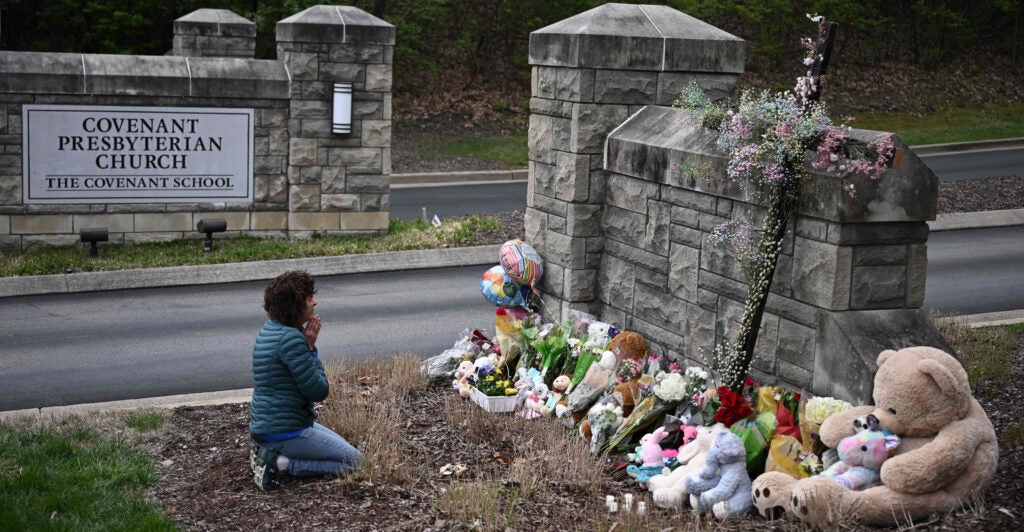Recently, there has been a spate of horrific homicides.
The killers, whether committing mass shootings or single killings, are hard to stereotype.
They can be clearly either mentally ill or simply innately evil. They can kill for revenge, for ideological purposes, out of hatred, for notoriety—or for no known reason at all.
They are probably left-wing and right-wing; white, black, and brown; young and old. While their weapons of choice are semiautomatic rifles, there are plenty of killers who favor handguns and even knives.
Unfortunately, these tragedies have increasingly become politicized.
Yet our media and politicians do not apply a common standard of reporting about either the victims, the killers, or the apparent motives and circumstances of the violence.
Instead, each horror is quickly analyzed for its political usefulness. Then its details are selectively downplayed or emphasized, depending upon the political agenda at work.
A sad example was the terrible killing spree at the private Christian Covenant School in Nashville, Tennessee. A transgender “male” fatally shot six people, including three 9-year-old children.
Almost immediately, three media narratives emerged.
One, semiautomatic weapons—not the killer Audrey Hale—were mostly responsible for the massacre.
Two, the shooter’s transgender identity profile played no role in the killing whatsoever.
Three, the public had no need to know of the contents of the shooter’s “manifesto.”
Why?
The media and authorities apparently assumed Hale’s written rantings tried to justify the killings because of Christianity’s supposed disapproval of transgenderism.
That censored reaction to the Tennessee shooting was quite different from another mass murder committed nearly six weeks later in Allen, Texas, by a former security guard, Mauricio Garcia.
Within minutes of the identification of the shooter, the media blared that Garcia wore pro-Nazi insignia and was thus a “white supremacist.”
Apparently, that narrative was deemed useful to promote the idea of white supremacist terrorists using their semiautomatic “assault” weapons to kill for right-wing agendas.
Yet second-generation Hispanic immigrants, whose parents do not speak English, are not likely “white supremacists.”
The strained effort to make violent “people of color” into white right-wing killers is reminiscent of Trayvon Martin’s death in 2012.
Then, the media reinvented the shooter, half-Peruvian George Zimmerman, into a “white Hispanic.” He was transformed into a right-wing vigilante and racist who supposedly hunted down an innocent black teenager.
The media did not wish to portray Martin’s death as a fight between a Hispanic and black teen. Instead, it tried to refashion the shooting as “systemic racism”—to the point of doctoring the 911 tape and editing Zimmerman’s police photo to fit its false narratives.
Recently, an African American man named Deion Patterson lethally shot one and wounded four others in an Atlanta medical facility waiting room. His own politics, race, and type of weapon were apparently of little interest. So, he was simply described as suffering from mental illness.
The media also did not wish to sensationalize either the profile or circumstances of another contemporaneous mass shooter, Francisco Oropeza. He executed five of his neighbors, including a young boy and two women.
Only later did we learn that Oropeza was in fact an immigrant in the country illegally who had been deported four times previously and returned each time through an open border.
Most recently, outrage grew over the homicide of Jordan Neely, a homeless man who frequented the subway and often threatened and occasionally attacked bystanders.
When a would-be good Samaritan and ex-Marine determined Neely’s latest threats to passengers were serious, he subdued him with a chokehold. Tragically, Neely died while being restrained.
A media circus followed. Neely was black. The former Marine who held him down was white. So, activists and the media immediately cited the death as yet more proof of systemic racism.
The public was lectured that Neely was a talented impersonator, who did professional street imitations of Michael Jackson.
The violent death of his mother, we were told, had traumatized him.
Released subway videos showed him on the floor of the subway, thrashing about while the white Marine held him in a headlock.
Protests and demands for a murder indictment followed.
Then later, the inevitable skipped details trickled out, despite—not because of—media coverage.
Neely had been arrested 42 times, including for lewd conduct, with three convictions for violent assaults.
His forte was brutally punching random victims in the face, including a 67-year-old woman, and a 68-year-old Hispanic male.
The news stories also neglected to mention that a black passenger helped subdue Neely.
The public learned there might be other, as yet unreleased, videos of Neely earlier threatening commuters.
Death is traumatic enough, without searching for ways to gain political traction from it.
It is eerie how each tragedy prompts a desperate effort to spin narratives of a racist America, where only right-wing killers and vigilantes prey on marginalized people of color and those who are transgender.
Once these fables become “facts,” then the media run with their fables.
COPYRIGHT 2023 Tribune Content Agency LLC
The Daily Signal publishes a variety of perspectives. Nothing written here is to be construed as representing the views of The Heritage Foundation.
Have an opinion about this article? To sound off, please email letters@DailySignal.com and we’ll consider publishing your edited remarks in our regular “We Hear You” feature. Remember to include the url or headline of the article plus your name and town and/or state.
